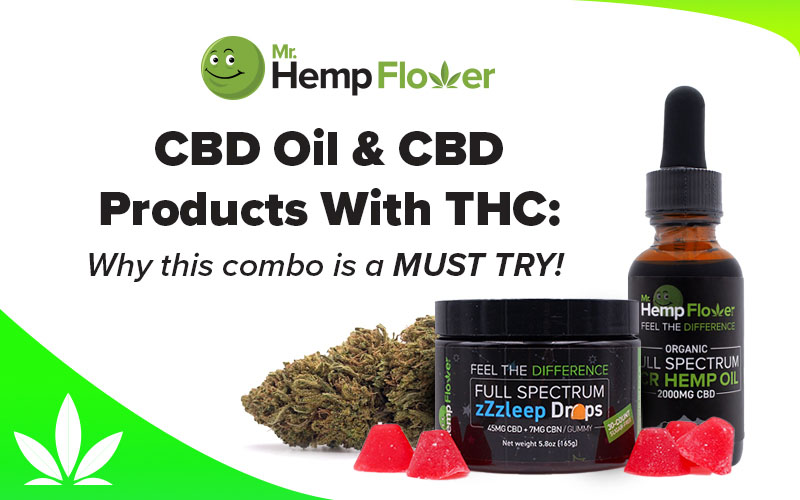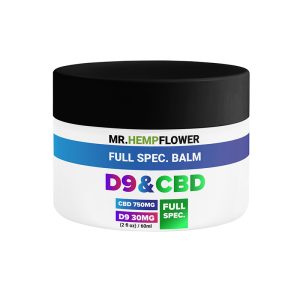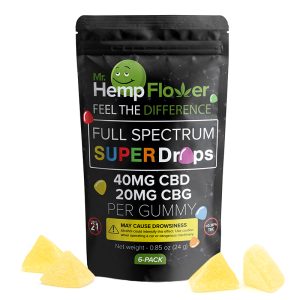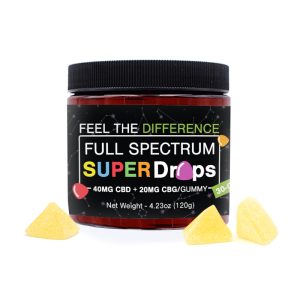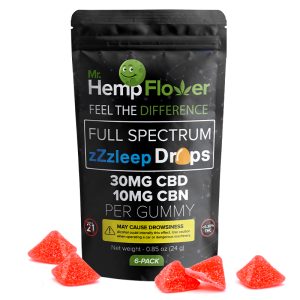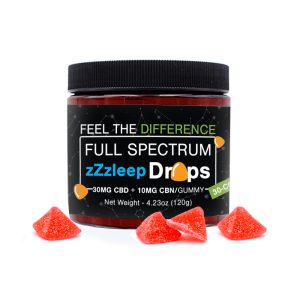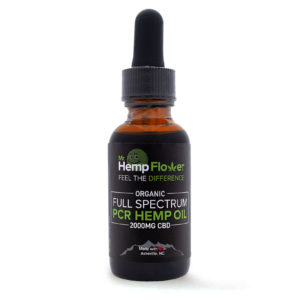CBD Oil & CBD With THC
The hemp world is experiencing its prime with the emergence of novel cannabinoids like HHC, HHC-O, THCP, and HHCP. However, none of these cannabinoids can be naturally extracted from the plant because they occur in trace amounts.
This begs the question: Is the natural combination of CBD and THC the best option available? Think about it, it’s the organic composition of the cannabis plant and works really well (as tested) for various ailments. This article discusses the beauty and beneficial properties of CBD products with THC and why you need one.
Best CBD with THC Products
Before we discuss the benefits of CBD products with THC, let’s take a look at some of our best products. Mr. Hemp Flower offers many CBD products enhanced with a legal concentration of delta 9 THC, including:
Phytocannabinoid-Rich Oil
Not all CBD oils are created equal.
Excellent for the mind, body, and brain, Mr. Hemp Flower’s PCR hemp Oil is not your ordinary CBD oil. It’s full spectrum CBD with added cannabinoids, terpenes, and flavonoids — or all-natural ingredients contained in the hemp plant. Most “regular” CBD oils don’t capture such a wide array of natural hemp compounds, but our oil does.
Check stellar reviews from people who have been looking for the highest quality CBD oil in the market, and finally found it.
CBD & THC Gummies
Can’t sleep? Our completely legal Delta 9 THC Gummies enriched with melatonin and the sleep cannabinoid, cannabinol (CBN), will knock you out and you won’t see it coming. These gummies represent a perfectly legal THC product derived from hemp that contains 10mg delta 9 THC and can be bought in all 50 states.
If you’re after a full spectrum CBD gummy, check out our golden, sugar-free gummies that contain up to 25mg+ of CBD and are full of terps.
What Is CBD?
CBD, short for cannabidiol, is the second most prevalent natural chemical compound found in cannabis and the first most prevalent in hemp. Around 30% of the total cannabinoid content in cannabis falls to CBD. This cannabinoid was first isolated in the 1940s and its structure was reported in 1963 [1].
The best thing about CBD is that it offers numerous therapeutic benefits for the body and mind without the “high.” To do that, it interacts with the body’s network of receptors known as the endocannabinoid system (ECS). The ECS regulates vital physical and mental functions, such as:
- Learning & memory
- Mood
- Immune response
- Reproductive functions
- Sleep
- Appetite
- Digestion
When the ECS is functioning like a well-oiled machine, the body is in a state of homeostasis or balance. The endocannabinoid system has its cannabinoid-like compounds that are known as endocannabinoids.
Clinical endocannabinoid deficiency (CECD) is a serious condition caused by not enough production of cannabinoids and can lead to chronic pain, digestive problems, poor sleep, and more [2]. More research is needed, but cannabinoids like CBD may help the ECS achieve the balance it needs.
What Is CBD Oil?
CBD oil is created by extracting cannabidiol from the hemp plant. CBD tinctures and CBD oil are not the same. CBD oil is diluted with a carrier oil, typically coconut or hemp seed oil, while a CBD tincture is alcohol-based.
Carrier oils improve bioavailability or make it possible for the body to absorb more of the CBD. These oils contain fatty acids that work as binding agents to increase bioavailability [3].
At Mr. Hemp Flower, we use MCT carrier oil in our full spectrum oils because it offers incredible potential benefits, such as:
- Promotes weight loss
- Improves athletic endurance
- Boosts energy
- Promotes gut health
- Boosts heart health
The only drawback of this oil is that it may cause diarrhea if used in excess, but we haven’t had any problems with that with any of our customers.
To further improve the bioavailability of the oil or tincture, consume the CBD oil sublingually. Placing a few drops of CBD oil under the tongue helps absorb the cannabinoid into the bloodstream more quickly than edibles. The soothing effects of CBD oil can be felt 15-30 minutes after use and can last from 3-5 hours, depending on the individual.
The sublingual method of consumption is not ideal because it leaves a strong herbal, oily taste in your mouth. An alternative is to add CBD to your morning smoothie, tea, or coffee, or prepare your salads and food with it. Edibles take a while to work, so you should feel them kick in after 45 minutes to an hour after use.
CBD Safety & Side Effects
CBD is safe to consume. Most people tolerate it well, but it can cause some adverse effects, like:
- Dry mouth
- Reduced appetite
- Diarrhea
- Lightheadedness
- Drowsiness
- Fatigue
This cannabinoid can also interact with certain medications, like blood thinners, so make sure to consult your doctor before use.
What Is THC?
THC is short for tetrahydrocannabinol — the primary intoxicating compound in cannabis. When talking about THC, or regular, traditional THC, most people mean delta 9 THC. But, the cannabis plant contains various forms of the THC isomer, including delta 7, delta 8, and delta 10 THC.
Like CBD, THC binds to the network receptors on the endocannabinoid system. More specifically, THC affects the CB1 receptor, or the one that causes intoxicating effects, and is located in the brain. It’s believed that by binding to this receptor group, THC produces its blissful, euphoric sensation.
THC is much stronger than CBD, primarily because it causes a “high.” That’s why it’s present in hemp products in a concentration of no more than 0.3%, which is the legal threshold under the 2018 Farm Bill. Dosing of this compound should be done carefully and start with the lowest dose of under 5mg.
THC Safety & Side Effects
Delta 9 THC is safe to consume. But, it needs to be dosed with caution. As a psychotropic substance, delta 9 THC comes with a couple of more side effects than CBD. If consumed in large doses, this product can lead to intense anxiety, hallucinations, and paranoia. Other side effects include:
- Red eyes
- Dry mouth
- Increased heart rate
- Memory loss
- Increased appetite (the munchies)
- Drowsiness
- Lethargy (couch lock)
- Coordination problems
- Slower reaction time
Delta 9 THC is the most active substance in marijuana, which is a Schedule I controlled substance on a federal level. Therefore, the THC in CBD products is extracted from hemp, which is legal under the 2019 Farm Bill.
What Are CBD Products With THC?
Shortly put, CBD products with THC are full spectrum products.
Full spectrum CBD oils and products contain the entire cannabinoid and terpene spectrum naturally found in the hemp plant. As they are derived from hemp, they contain less than 0.3% delta 9 THC. They are available as oils, gummies and other edibles, vapes, hemp flower and pre-rolls — and Mr. Hemp Flower offers them all.
What Are THC-Free CBD Products?
Aside from full spectrum CBD products that always contain THC, there are two other categories of CBD products:
- Broad spectrum CBD
- CBD Isolate
Broad spectrum CBD oil and products don’t contain any concentration of delta 9 THC but are rich in terpenes and all other compounds naturally found in the plant. Terpenes are aromatic compounds found in all plant life that give cannabis its potent aroma and flavor.
CBD isolate is 100% CBD. Pure CBD doesn’t contain any other cannabinoid or terpene that naturally occurs in cannabis.
THC-free CBD products are available in most forms — except hemp flower and pre-rolls because hemp flower with zero THC doesn’t exist. You can find them as oils, tinctures, vape carts, edibles, capsules, and concentrates.
CBD With THC vs. Without THC: Which Is Better?
Although THC is intoxicating, it definitely plays a major role in the effectiveness of cannabis products.
Adding THC to the mix, even in trace amounts, makes the product more potent and strengthens its features. It’s not a coincidence that the cannabis plant produces the primary cannabinoids as opposites, but they support each other in different ways.
So, combining THC and CBD creates a more potent product rather than using them separately [4].
Terpenes play a major role in the potency of a cannabis product because they lift up the beneficial effects of cannabinoids. This is known as the entourage effects and shows that products with all hemp compounds are better than isolates because the ingredients work in synergy to create a more therapeutic effect.
THC-free products work, but not as well as CBD products with THC. If you’re worried about the THC in full spectrum products, don’t be because their delta 9 THC levels are so low that you won’t even notice it.
CBD isolates and broad spectrum products are best for users who don’t want to risk it with THC. Drug tests don’t test for CBD, but theoretically, if the product contains enough concentration of THC, it might show up on a drug test.
Key Differences Between THC and CBD
CBD and THC have a lot in common, but there are key differences that determine how to use them.
Chemical Structure
CBD and THC share the same chemical molecular structure: 21 carbon atoms, 30 hydrogen, and 2 oxygen atoms. Both compounds embody a similar chemical structure to the endocannabinoids, which allows them to interact with the body’s cannabinoid receptors.
Psychoactive Effects
CBD and THC offer many of the same therapeutic benefits: they may alleviate pain, stress, and help with sleep. Ultimately, they do it in a vastly different way as THC delivers a sense of blissful euphoria, while CBD is more subtle and doesn’t cause a high.
THC produces a high by binding with the CB1 receptors in the brain. CBD binds mostly to CB2 receptors, and because of that, it can help reduce some of the unwanted psychoactive effects of THC.
Source & Legality
CBD and THC are sourced from the two variants of the cannabis plant: hemp and marijuana. Hemp contains less than 0.3% delta 9 THC by dry weight, while THC’s levels on marijuana average 15 to 20%.
The source of extraction of these two cannabinoids is vital for the legality of the final product. CBD oil derived from hemp is legal in all 50 states under the 2018 Farm Bill. Marijuana-derived CBD is only legal for medicinal use and in states where recreational use is permitted.
Mr. Hemp Flower offers Farm Bill-compliant hemp-derived products with less than 0.3% delta 9 THC. Some of our products contain a higher percentage of THC, but are still legal. Each product comes with a Certificate of Analysis performed by a third-party lab and has a scannable QR code to prove authenticity.
As the leader on the market, Mr. Hemp Flower provides organically grown hemp from local farms in Colorado, Oregon, and North Carolina. We provide full traceability of products and lab results for our CBD-rich flower.
Conclusion: CBD Oil & CBD Products With THC
Both CBD oil and CBD products with THC offer incredible benefits. They have their differences, so it’s important to know which combination is stronger and will provide a better outcome.
CBD oil without THC is perfect for anyone looking to avoid delta 9. Luckily, there are tons of quality broad spectrum products and isolates to choose from. Mr. Hemp Flower believes in the power of full spectrum extracts, and our product line reflects that.
FAQs on CBD Oil & CBD Products With THC
Does CBD oil have THC in it?
It depends on the type of oil. The only type of CBD oil that contains THC is full spectrum CBD oil. Broad spectrum and CBD isolate don’t contain any THC.
Does CBD oil need THC to work?
No, CBD possesses beneficial properties when used in an isolated form, which is dose-dependent — the higher the dose, the stronger the effects. But, when the dose reaches its peak, the effects dwindle. CBD oil with THC, on the other hand, offers a more potent effect and is better used in smaller doses.
What’s better for pain, CBD or THC?
Studies show that a combination of both works great for pain. CBD works better for inflammatory pain, while THC for nerve pain.
Does CBD cream work better with THC?
It depends on the user. For some users, CBD-rich topicals with zero THC work better than those with a certain percentage of THC.

